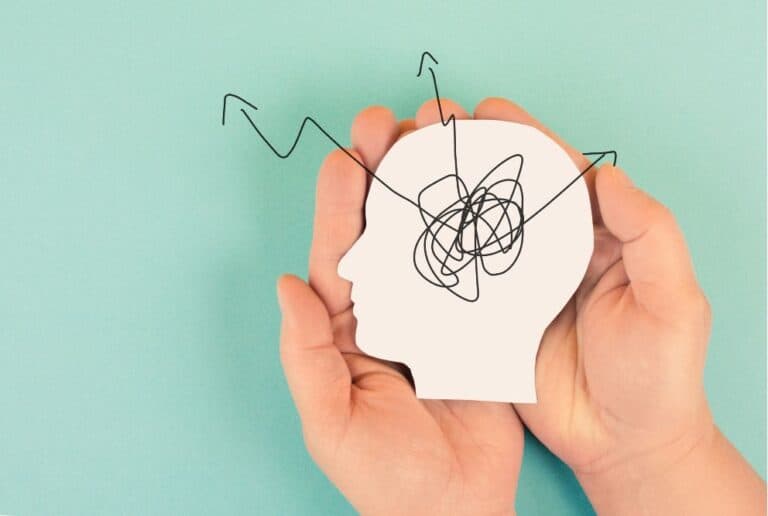Millions of people around the world suffer from mental illness and addiction. This is a complex and difficult situation to deal with, not just for the individual struggling with addiction and a mental health disorder but also for their loved ones.
Mental health disorders such as depression, anxiety, bipolar disorder, schizophrenia, and others can lead to self-medicating with alcohol or drugs. This combination can significantly worsen the symptoms of both mental health disorders and substance use disorders, making it challenging to seek treatment.
However, recovery is possible. It may not be easy, but with determination and support, individuals can overcome addiction and manage their mental disorders more healthily.
The Link Between Mental Health and Substance Abuse
Mental illness and substance use often go hand in hand. Many people with a mental disorder will turn to drugs or alcohol as a way to self-medicate and temporarily numb their symptoms. This can also be influenced by genetic, environmental, and social factors.
Substance use disorders can increase the risk of developing mental health disorders as well. Drugs and alcohol can alter brain chemistry, leading to changes in mood, behavior, and cognitive function. This can trigger an underlying mental health issue or worsen existing conditions.
This can lead to a dangerous cycle of self-medicating, where drugs or alcohol cause mental health symptoms to worsen, leading to more substance use in an attempt to cope. It’s essential to address both mental illness and addiction simultaneously for successful recovery.
Breaking the Cycle: The Importance of Dual Diagnosis Treatment
Addressing both substance use disorders and co-occurring mental health problems simultaneously is essential for full recovery. This approach, known as dual diagnosis treatment, recognizes the intertwined nature of substance use disorder and mental disorders and aims to treat them together.
Dual-diagnosis treatment programs typically involve a combination of medication, therapy, and lifestyle changes to help an individual quit their drug use while also addressing their mental disorder to help prevent a future relapse.
Medication for Drug Abuse and Mental Health Disorders
Medication can play a crucial role in treating both substance use disorders and mental health disorders. For example, medications such as buprenorphine and methadone can be an effective treatment plan for helping individuals overcome opioid addiction and withdrawal symptoms from severe substance use, while antidepressants or antipsychotics may be prescribed for those with depression or schizophrenia.
It’s essential to work closely with healthcare providers to find the right medication and dosage for each individual’s unique needs and to monitor any potential side effects.

Behavioral Therapies for a Mental Health Disorder and Addiction
Behavioral therapies are an integral part of treatment and can help individuals address the underlying issues that contribute to both substance use disorder and any co-occurring disorder.
Cognitive-behavioral therapy (CBT)
CBT is a common form of behavioral therapy used to help treat substance use disorders and other mental disorders. It helps individuals identify and change negative thought patterns and behaviors that contribute to substance use disorder and mental health issues.
Dialectical behavior therapy (DBT)
DBT can help individuals develop coping strategies for dealing with difficult emotions and reducing self-destructive behaviors such as drug or alcohol abuse. It focuses on mindfulness, emotion regulation, distress tolerance, and interpersonal effectiveness.
Family Therapy
Involving family members in therapy can also be beneficial for individuals with co-occurring disorders. It can help strengthen relationships, improve communication and support, and create a more supportive environment for recovery.
Group Therapy and Support Groups
Group therapy and support groups can provide a sense of community, understanding, and accountability for individuals in dual-diagnosis programs. It allows people to connect with others who are going through similar struggles, share experiences, and learn from each other. Alcoholics Anonymous (AA) and Narcotics Anonymous (NA) are two well-known support groups that can aid in recovery.

Get The Care You Need and Deserve
Woburn Addiction Treatment is a leader in the addiction treatment field, with proven success in facilitating long-term recovery. Our team of top clinical & medical experts specializes in treating addiction coupled with mental illness, ensuring that each person receives individualized care. Call us – we’re available 24/day, 7 days/week.
Lifestyle Changes
Making positive lifestyle changes can also greatly aid in recovery from mental illness, alcohol abuse, and drug use. This may include finding healthy coping mechanisms, establishing a support system, and making necessary adjustments to one’s daily routine or environment.
What Types of Mental Disorders are Associated with Substance Use Disorders?
Aside from depression, there are many other mental disorders that can co-occur with substance use disorder. Some common examples include:
- Anxiety disorders
- Bipolar disorder
- Post-traumatic stress disorder (PTSD)
- Attention-deficit hyperactivity disorder (ADHD)
Other mental illnesses, such as schizophrenia and borderline personality disorder, may also occur in conjunction with substance use. It is essential to address both mental health disorders and substance use disorders in these cases, as they often exacerbate each other.
The Role of Support in Recovery
Recovery from mental illness and substance use disorders can be a long and challenging journey, but having a strong support system can make all the difference. This may include loved ones, therapists, support groups, or peers who have gone through similar experiences.
Additionally, seeking professional help from a mental health specialist or addiction treatment center can provide the necessary support and guidance for a successful recovery.
Breaking Through Stigma of Mental Health and Addiction
Unfortunately, there is still a significant stigma surrounding mental illness and addiction, which can make it challenging for individuals to seek help. This stigma may come from society, loved ones, or even the individual themselves.
It is crucial to understand that mental health disorders and substance use disorders are not a choice or a sign of weakness. They are medical conditions that require treatment and support, just like any other illness.
Moving Forward: A Life of Sobriety and Mental Wellness
Recovery is an ongoing process that requires dedication and effort, but it is possible to overcome alcohol and/or drug use and co-occurring mental health disorders. It’s crucial to remember that setbacks can happen, but with the right treatment and support, a fulfilling life of sobriety and mental wellness is achievable.
Woburn Addiction Treatment
If you or someone you know is struggling with mental health, alcohol, or drug problems, reach out for help using our online contact form and start the journey toward recovery today. Woburn Addiction Treatment offers a comprehensive dual-diagnosis program that addresses the unique needs of individuals struggling with both mental health and substance use disorders. Our team of professionals is dedicated to helping you break free from the cycle and achieve lasting recovery.


